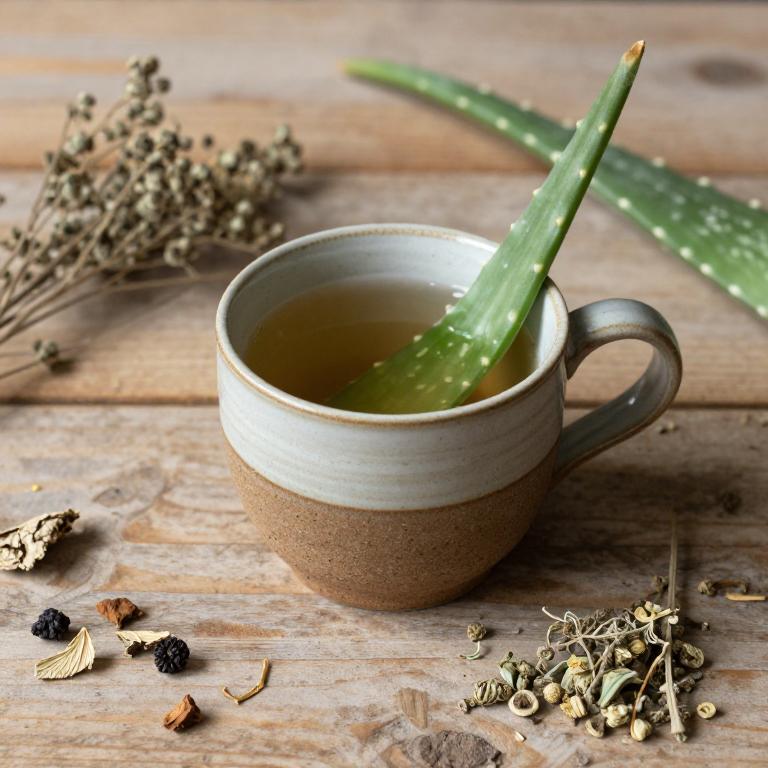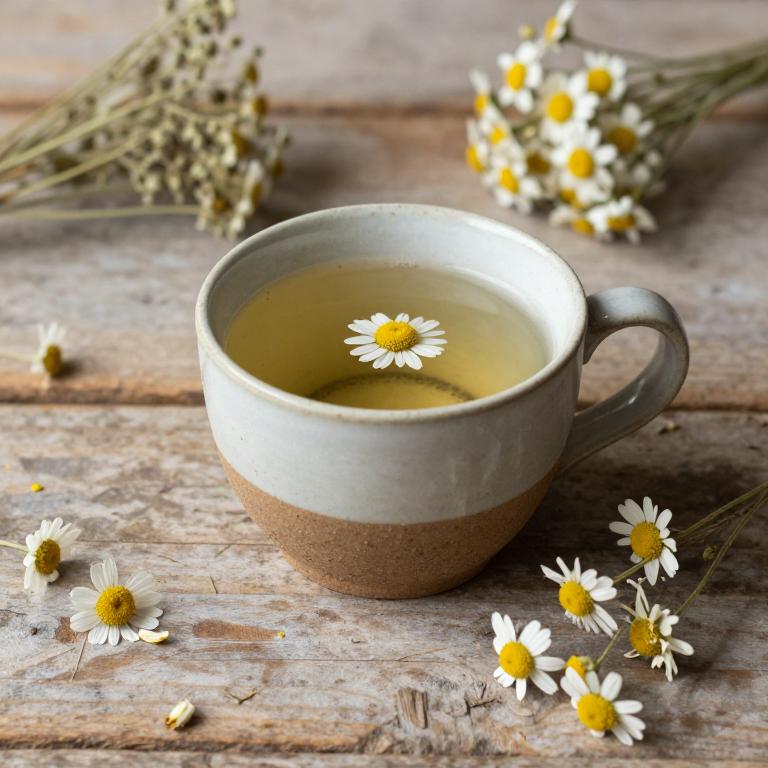10 Best Herbal Teas For Dermatitis

Herbal teas can be a natural and soothing remedy for individuals suffering from dermatitis, as they often contain anti-inflammatory and antioxidant properties that help reduce skin irritation.
Chamomile, calendula, and green tea are among the most commonly recommended herbs for their calming effects on the skin. These teas can be applied topically as compresses or consumed internally to support overall skin health. However, it is important to consult a healthcare provider before using herbal remedies, as some herbs may cause allergic reactions or interact with medications.
When used appropriately, herbal teas can complement conventional treatments and offer a gentle approach to managing dermatitis symptoms.
Table of Contents
- 1. Chamomile (Matricaria chamomilla)
- 2. Camellia (Camellia sinensis)
- 3. Aloe vera (Aloe barbadensis)
- 4. Stinging nettle (Urtica dioica)
- 5. St. john's wort (Hypericum perforatum)
- 6. Field horsetail (Equisetum arvense)
- 7. Dog rose (Rosa canina)
- 8. English lavender (Lavandula angustifolia)
- 9. Blessed thistle (Cnicus benedictus)
- 10. German chamomile (Chamomilla recutita)
1. Chamomile (Matricaria chamomilla)

Matricaria chamomilla, commonly known as chamomile, is a popular herbal remedy used in the form of tea to alleviate symptoms of dermatitis.
The tea is valued for its anti-inflammatory and antiseptic properties, which can help reduce redness, itching, and irritation associated with various types of dermatitis. Chamomile contains compounds like bisabolol and chamazulene that contribute to its soothing effects on the skin. When applied topically or consumed as a tea, it may help promote healing and provide relief from skin inflammation.
However, individuals with allergies to plants in the Asteraceae family should use chamomile cautiously, as it may trigger adverse reactions.
2. Camellia (Camellia sinensis)

Camellia sinensis, the plant from which green and black teas are derived, contains bioactive compounds such as polyphenols, catechins, and antioxidants that have shown potential in reducing inflammation and supporting skin health.
These compounds may help alleviate symptoms of dermatitis by modulating immune responses and reducing oxidative stress, which are often implicated in inflammatory skin conditions. Herbal teas made from Camellia sinensis are generally considered safe and can be consumed as a natural complement to conventional treatments for dermatitis. However, individual responses may vary, and it is advisable to consult a healthcare professional before incorporating these teas into a skincare regimen.
Overall, Camellia sinensis herbal teas offer a promising, non-invasive approach to managing dermatitis through their anti-inflammatory and antioxidant properties.
3. Aloe vera (Aloe barbadensis)

Aloe barbadensis, commonly known as aloe vera, is often used in herbal teas to support skin health and alleviate symptoms of dermatitis.
The plant contains compounds like polysaccharides, antioxidants, and anti-inflammatory agents that can help reduce redness, irritation, and itching associated with dermatitis. When consumed as a herbal tea, aloe vera may support the body's natural healing processes and promote skin regeneration. However, it is important to note that topical application of aloe vera is more commonly recommended for dermatitis due to its direct soothing effects on the skin.
As with any herbal remedy, it is advisable to consult a healthcare professional before incorporating aloe barbadensis into a treatment regimen for dermatitis.
4. Stinging nettle (Urtica dioica)

Urtica dioica, commonly known as stinging nettle, has been traditionally used in herbal medicine for its potential anti-inflammatory and skin-soothing properties.
When prepared as a herbal tea, it may help alleviate symptoms of dermatitis by reducing redness, itching, and irritation due to its high content of antioxidants and minerals. The leaves of stinging nettle contain compounds like quercetin and rutin, which have been shown to support skin health and reduce allergic reactions. However, it is important to consult a healthcare provider before using nettle tea, especially for those with sensitive skin or existing medical conditions.
While some studies suggest its benefits, more research is needed to fully understand its efficacy in treating dermatitis.
5. St. john's wort (Hypericum perforatum)

Hypericum perforatum, commonly known as St. John's Wort, has been traditionally used in herbal teas to support skin health and alleviate symptoms of dermatitis.
The tea is believed to possess anti-inflammatory and antimicrobial properties that can help reduce redness, itching, and irritation associated with various skin conditions. When consumed internally, it may help modulate the immune system and reduce allergic reactions that contribute to dermatitis flare-ups. However, it is important to note that St. John's Wort can interact with certain medications, so consultation with a healthcare provider is recommended before use.
Despite its potential benefits, it should not be used as a sole treatment for severe or persistent dermatitis without professional guidance.
6. Field horsetail (Equisetum arvense)

Equisetum arvense, commonly known as field horsetail, has been traditionally used in herbal teas to support skin health and alleviate symptoms of dermatitis.
The tea is rich in silica, which is believed to strengthen the skin's structural integrity and promote healing. It may also contain anti-inflammatory compounds that help reduce redness and irritation associated with eczema and contact dermatitis. When prepared properly, horsetail tea can be applied topically or consumed internally to support overall skin vitality.
However, it is important to consult a healthcare provider before using it, as it may interact with certain medications or have side effects in some individuals.
7. Dog rose (Rosa canina)

Rosa canina, commonly known as rose hip, is a traditional herbal remedy that has been used for centuries to support skin health.
Rose hip tea is particularly beneficial for individuals suffering from dermatitis due to its high content of antioxidants, vitamins, and anti-inflammatory compounds. The tea helps reduce redness, inflammation, and irritation associated with various types of dermatitis, including eczema and psoriasis. Its natural anti-inflammatory properties may also aid in soothing sensitive skin and promoting a calming effect.
Incorporating rosa canina herbal tea into a skincare routine can be a gentle and effective complementary approach to managing dermatitis symptoms.
8. English lavender (Lavandula angustifolia)

Lavandula angustifolia, commonly known as English lavender, is widely used in herbal teas for its calming and anti-inflammatory properties.
This herb contains essential oils such as linalool and linalyl acetate, which have been shown to reduce skin irritation and redness associated with dermatitis. When consumed as a tea, lavender can help soothe internal inflammation, potentially supporting skin health from within. Additionally, topical application of lavender-infused oils or creams is often recommended alongside internal consumption for enhanced relief.
Overall, lavender tea is a natural and gentle option for managing symptoms of dermatitis, though it should be used as part of a comprehensive skincare and health regimen.
9. Blessed thistle (Cnicus benedictus)

Cnicus benedictus, also known as blessed thorn, has been traditionally used in herbal teas to support skin health and alleviate symptoms of dermatitis.
This plant contains anti-inflammatory and antioxidant properties that may help reduce redness, itching, and irritation associated with eczema and other inflammatory skin conditions. When brewed into a tea, it can be consumed internally to promote overall detoxification and skin renewal, or applied topically as a compress for localized relief. Its historical use in herbal medicine suggests potential benefits for those seeking natural remedies for dermatitis.
However, it is important to consult with a healthcare professional before using Cnicus benedictus to ensure safety and proper usage.
10. German chamomile (Chamomilla recutita)

Chamomilla recutita, commonly known as German chamomile, is widely used in herbal teas for its soothing and anti-inflammatory properties, making it a popular remedy for dermatitis.
The active compounds in chamomile, such as bisabolol and chamazulene, help reduce skin irritation, redness, and itching associated with various forms of dermatitis. When brewed into a tea and applied topically or consumed internally, chamomile can support skin healing and alleviate symptoms. Its mild sedative effects also contribute to overall relaxation, which may indirectly benefit skin health by reducing stress-related flare-ups.
However, individuals with allergies to plants in the Asteraceae family should exercise caution, as chamomile may trigger allergic reactions in some cases.